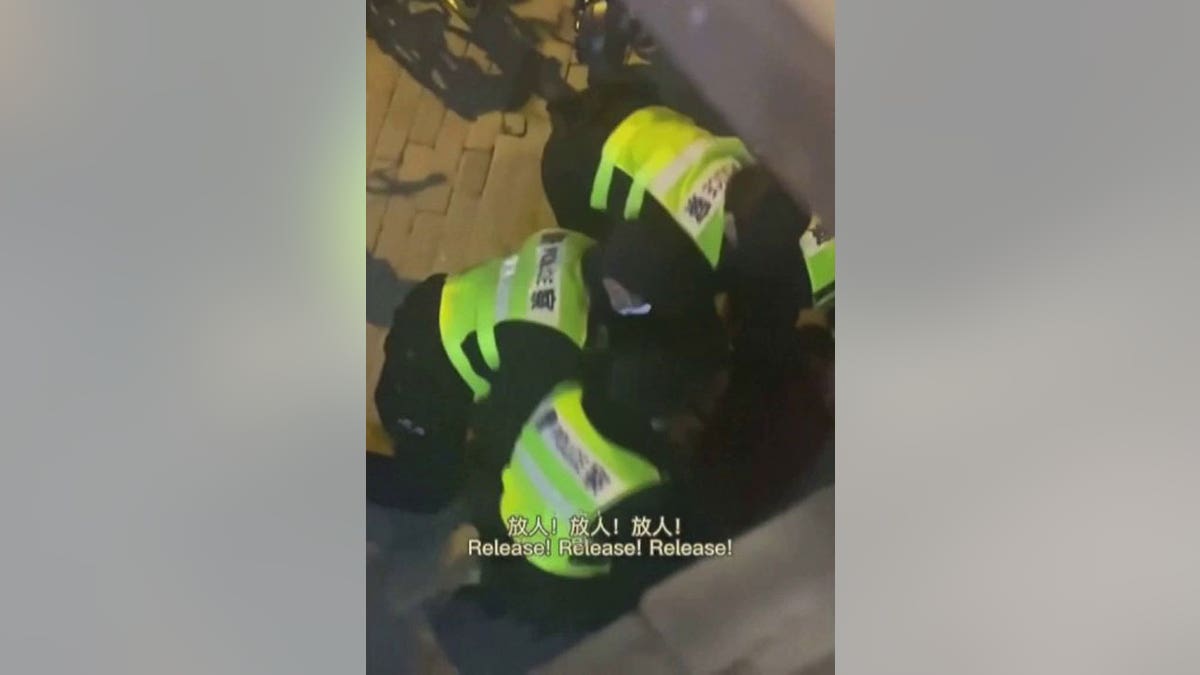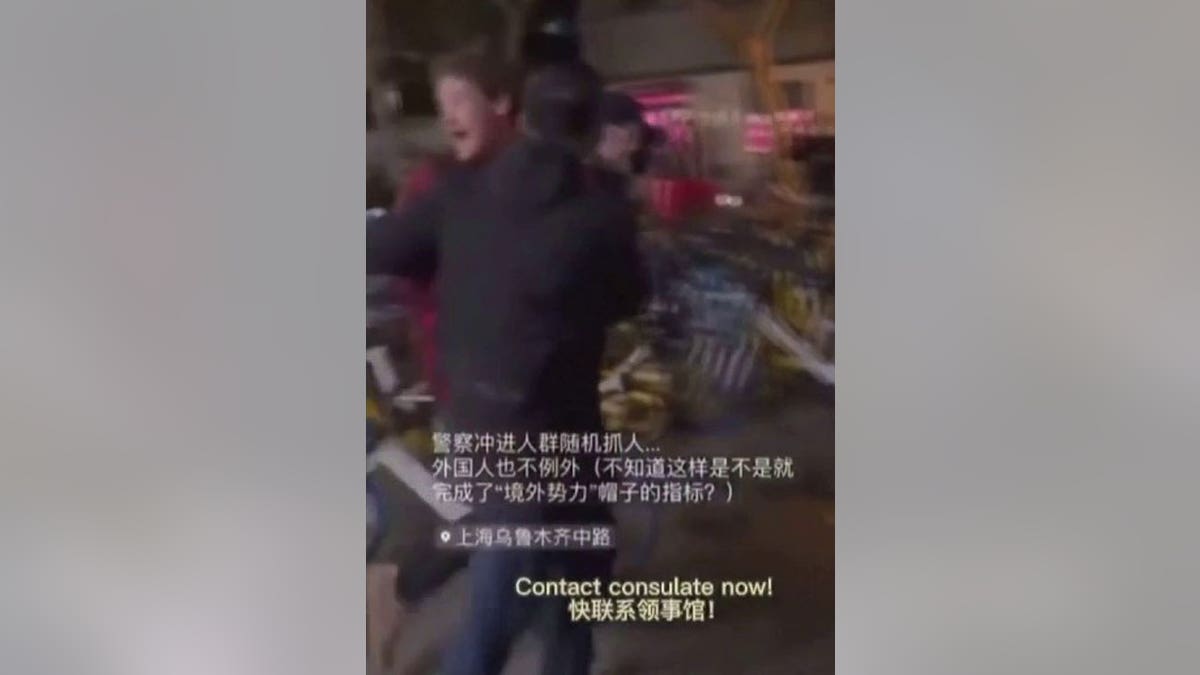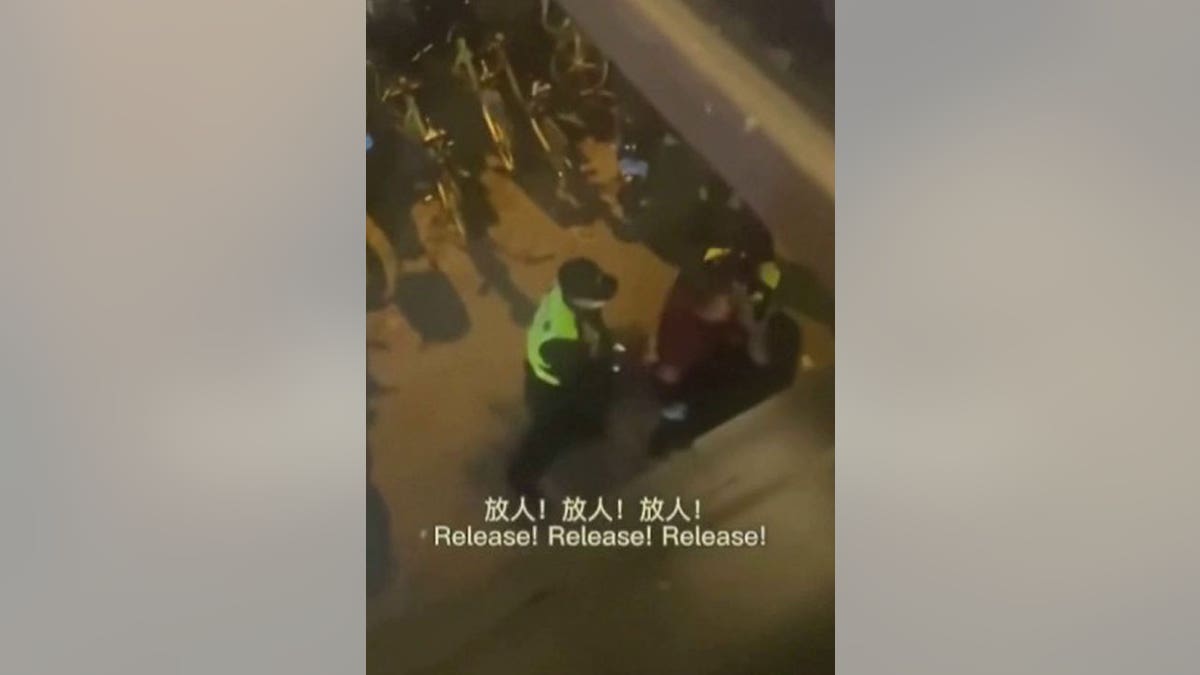Chinese officers arrest BBC reporter, who says he was 'beaten and kicked by police'
BBC journalist Ed Lawrence was assaulted by Chinese police and detained for several hours after covering anti-lockdown protests in Shanghai, the British network said. (Reuters)
A video shows the moment a BBC journalist covering anti-lockdown protests in Shanghai was arrested by Chinese police before he was allegedly detained for several hours.
Ed Lawrence, a camera operator for BBC's China Bureau, was "beaten and kicked by police" during a Shanghai demonstration that erupted into violent clashes between police and protesters, the British network said in a statement Sunday. Chinese authorities claim Lawrence did not show his credentials and have accused U.K. media of "hypocrisy and double standards" over the incident.
The video of the arrest shows at least five Chinese police officers detaining Lawrence on the ground, handcuffing him and dragging him away.
Demonstrators can be heard shouting "release!" as the arrest was made and Lawrence was manhandled.
"The BBC is extremely concerned about the treatment of our journalist Ed Lawrence, who was arrested and handcuffed while covering the protests in Shanghai," a BBC spokesperson said Sunday.

Chinese law enforcement arresting a BBC reporter on the floor after covering anti-lockdown protests in Shanghai. (Reuters)

Chinese law enforcement walking the BBC reporter away as he yells out to contact the consulate in Shanghai. (Reuters)
"He was held for several hours before being released. During his arrest, he was beaten and kicked by the police. This happened while he was working as an accredited journalist," the spokesperson added.
The BBC said the incident was "worrying" and that no "credible" reason for Lawrence's detention was given.
CHINESE POLICE GET VIOLENT AS COVID-19 LOCKDOWN PROTESTS SWEEP ACROSS THE COUNTRY
Chinese Foreign Ministry spokeswoman Hua Chunying responded to the BBC on Tuesday morning, accusing the outlet of misrepresenting what happened.
"To set the fact straight, the BBC journalist did not show his credentials, and brushed aside requests from the police. Is BBC reporting news or making news?" Chunying tweeted.

Chinese law enforcement taking the BBC reporter away after having arrested him on the street for coving the anti-lockdown protests in Shanghai. (Reuters)
"Furthermore, official UK comment on what happened in Shanghai shows nothing but usual hypocrisy and double standards," she continued. "If the UK gov respects media freedom and freedom to protest then why did it obstruct and assault the Chinese journalist when she was just asking questions and expressing her legitimate views at a side event of the UK Conservative Party’s annual conference and later even claim her guilty? That’s hypocrisy and double standards. Period."
CHINA REPORTS RECORD NUMBER OF NEW DAILY CORONAVIRUS CASES IN BEIJING, OTHER CITIES
The Foreign Ministry appears to be referencing a 2019 incident when Linlin Kong, a Chinese state TV journalist, was found guilty of assaulting a Conservative Party conference delegate. A judge found that Kong, CCTV's longtime chief U.K. political correspondent, was guilty of slapping Conservative MP Enoch Lieu, according to The Guardian.
Chunying also accused the U.K. government of hypocrisy for cracking down on anti-COVID-19 lockdown protesters in London last year, noting more than 200 people were arrested in 2021.
"And how does the UK gov handle domestic protesters? In 2020 the police arrested 150+ people protesting against Covid lockdown in London," she wrote. "In 2021 more than 200 people were arrested in large-scale demonstrations against public expenditure cuts. Videos show that UK police kicked and beat unarmed protesters."
CLICK HERE TO GET THE FOX NEWS APP
The U.K. Foreign, Commonwealth and Development Office did not immediately respond to a request for comment.
Fox News' Yael Halon contributed to this report.









































